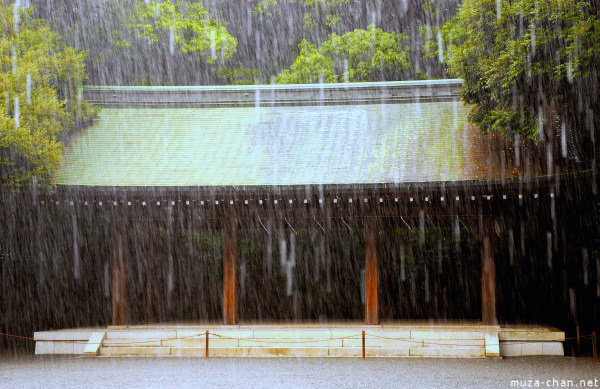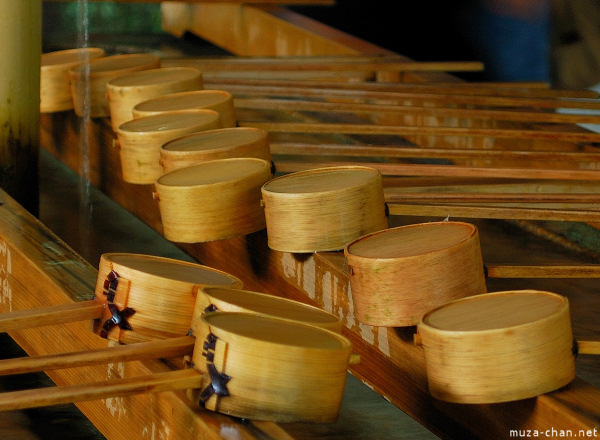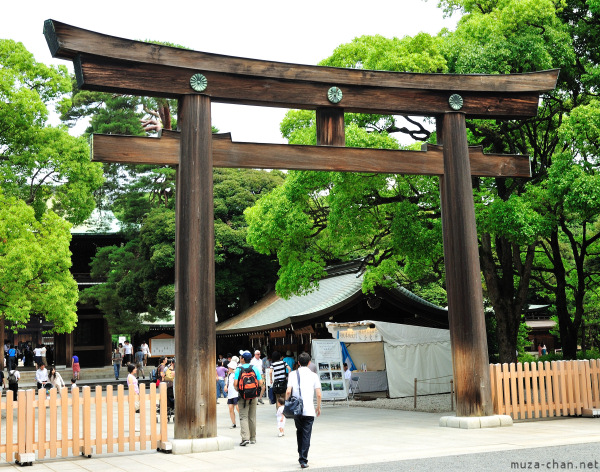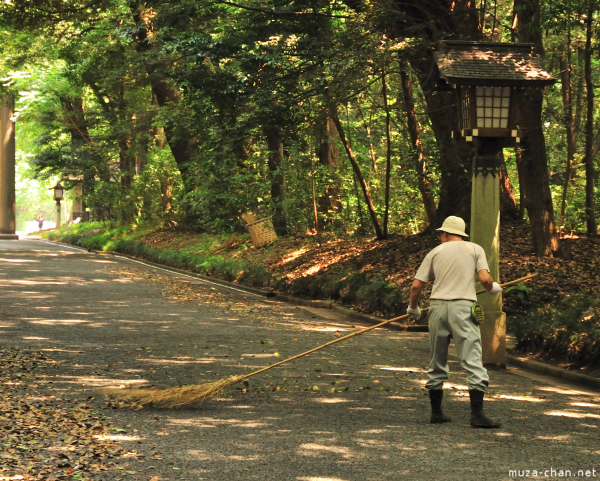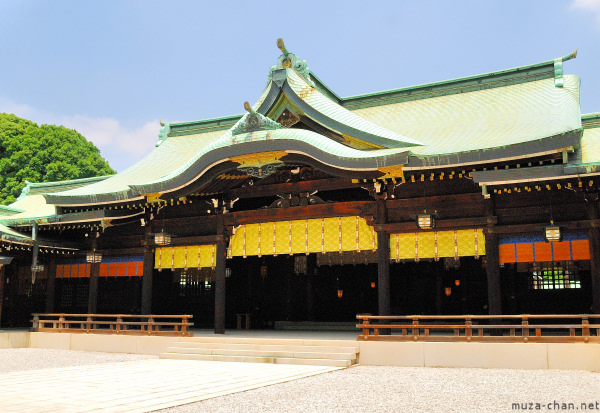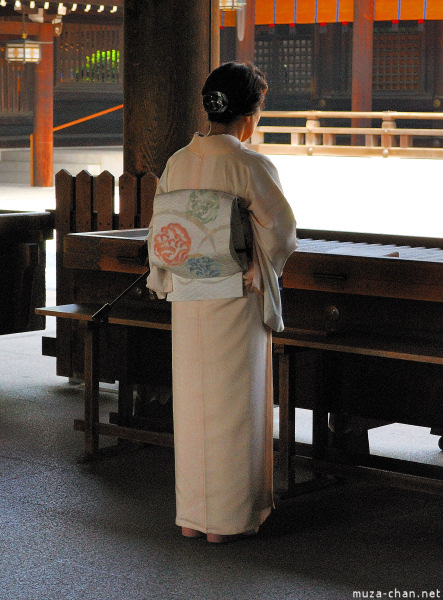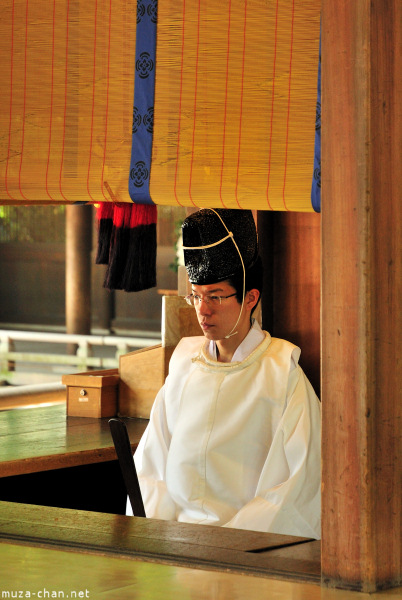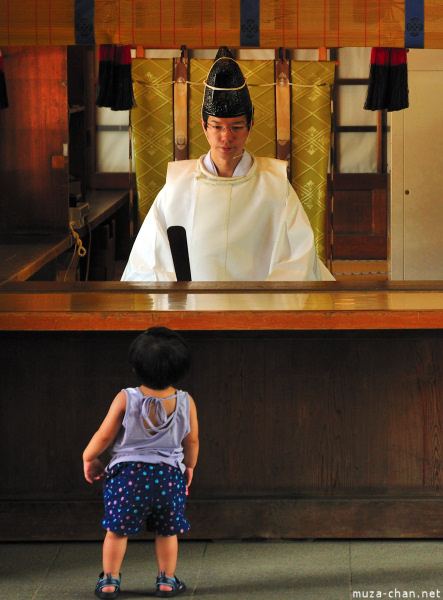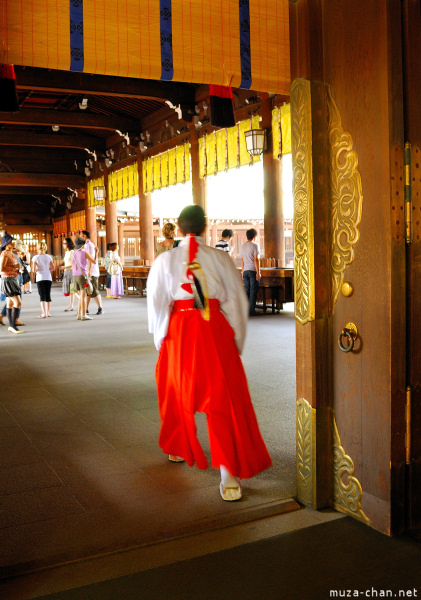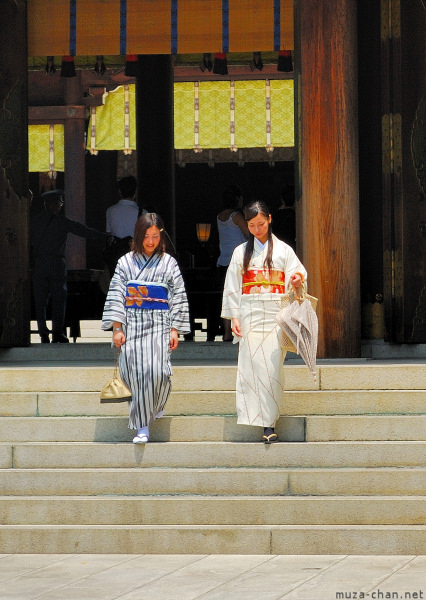Not infrequently, events I couldn’t control and that messed up my tight schedule, where more good than bad. An event like this happened on my first visit to Meiji Jingu, when a strong rain caught me, probably not by accident, next to the temizuya and forced me to stop for about half an hour.
For a while, I stayed upset, trying to estimate how long it will last. I was looking at the big raindrops, hitting and moving the pebbles from the pavement. Then, the rain got stronger, the raindrops merged into a sheet of water and the building across seemed to change the colors and textures, looking like an impressionist painting. On that moment, everything changed for me and I started to enjoy the beauty of those moments.
Eventually, the rain diminished and the sheet of water, that created the magic, dissapeared. The sound of the rain decreased and my attention moved to the swish of the water from the temizuya.
Only after that I realized how much I needed that forced stop from the obsessive curiosity that urged me to go to as many places as possible. Unable to do anything else than waiting, I managed to relax and feel the peace and spirituality of that place, and that experience was the most powerful spiritual experience in Japan.
One year after that, when I came back to Meiji Jingu, I noticed that once I passed the first torii, the noise of the city fades away. The old trees muffle even the noises coming from the nearby train. The sounds of the city where replaced by cicada songs, hundreds of voices: Min mi min min mi! The crows also participated with their cawing and on that moment, I understood a part of the Japanese folklore, the mysterious magical beings that lived in the woods (youkai). I felt like I was watched by hundreds of small eyes, hidden in the leaves.
An old man sweeping the dead leaves, calm, quiet, slow, reminded me of a poem by Nichita Stanescu, “In haiku spirit“:
“If time would have had leaves
what an autumn“
When I reached the shrine I was melancholic.
The feeling remained, because inside the shrine there were just a few persons, praying.
On one side, a priest was standing motionless, impassive to everything around him.
Then, a child approached, staring at him insistently, as only children can do. They remained in this position for a few good moments. Several other persons noticed the scene and smiled, but the priests face remained unchanged. I photographed the scene, waiting for the end of this stand-off. Eventually, the child got bored and left.
I was also preparing to leave when a miko appeared next to me without a sound, almost startling me. I instinctively raised the camera and took a photo.
For a place to become favorite, it must not only be beautiful, it must be related to a person, an event, a joy, something to impress me. A few observations and simple events that moved me, made me love this place and I consider it my favorite place in Japan.
Nu de puţine ori, evenimente pe care nu le-am putut controla şi care mi-au dat peste cap programul mult prea încărcat, au avut mai multe părţi bune decât rele. Un asemenea eveniment s-a întâmplat la prima vizită la Meiji Jingu, când o repriză de ploaie torenţială m-a prins, probabil nu întâmplător, lângă temizuya şi m-a obligat să stau câteva zeci de minute în acel loc.
O vreme am stat bosumflată, supărată, încercând să-mi dau seama cât va dura. Priveam picăturile mari, rare, care se izbeau de pietrişul de pe alee, mutând pietricelele mici. Apoi, ploaia s-a înteţit, picăturile s-au unit şi au devenit şuvoaie. Clădirea de vis-a-vis se vedea printr-o pânză de apă care îi schimba culorile şi textura, făcând-o să arate ca o pictură impresionistă. În momentul acela totul s-a schimbat şi am început să mă bucur de frumuseţea acelor clipe.
După o vreme, ploaia s-a domolit şi pânza de apă care crea magia a dispărut. Zgomotul făcut de ploaie s-a micşorat şi mi-a atras atenţia susurul de apă cristalină de la temizuya.
Abia după aceea am realizat cât de mare nevoie aveam de ceva care să mă oprească din starea de curiozitate obsesivă, care mă îndemna să merg în cât mai multe locuri cu putinţă. Neputând să fac altceva decât să aştept, am reuşit să mă liniştesc, să simt pacea şi sacralitatea acelui loc, iar acea experienţă a fost cea mai puternică, din punct de vedere spiritual, din Japonia.
Anul următor, când am revenit la Meiji Jingu, am remarcat că odată ce am trecut de primul torii, zgomotul oraşului a dispărut ca prin farmec. Copacii bătrâni, cu frunziş bogat, atenuau până şi zgomotul trenului care trecea prin apropiere. Sunetele oraşului au fost înlocuite de cântecul cicadelor, sute de voci care cântau simultan: Min mi min min mi! Nici corbii nu se lăsau mai prejos, din loc în loc se auzea câte un strigăt. Aşa am înţeles o parte din folclorul japonez, ideea de fiinţe misterioase care locuiesc în păduri (youkai). M-am simţit privită de sute de ochi minusculi, pitiţi printre frunze.
Bătrânul care mătura frunzele căzute, calm, liniştit, lent, mi-a adus aminte de o poezie a lui Nichita Stănescu, “În spirit de haiku“:
“Dacă timpul ar avea frunze
ce toamnă!“
Când am ajuns la altar eram într-o stare melancolică.
Impresia a rămas, pentru că înăuntru era linişte, doar câteva persoane venite la rugăciune.
Într-o parte, un preot stătea nemişcat ca o statuie, indiferent la tot ce se întâmpla în jurul lui.
La un moment dat, un copil s-a aşezat în faţa sa, privindu-l insistent, cum numai copiii ştiu să o facă. Cei doi au rămas aşa o vreme. Câteva persoane au observat scena, zâmbind, însă pe chipul preotului nu am văzut nicio tresărire. Am fotografiat scena, aşteptând finalul acestei “înfruntări". În cele din urmă, copilul s-a plictisit şi a plecat.
Mă pregăteam să plec, când o miko mi-a apărut în faţă şi m-a făcut să tresar. Trecuse rapid pe lângă mine, fără să o aud, cu paşi uşori şi rapizi, ca o nălucă. Am dus instinctiv aparatul la ochi şi am făcut o fotografie.
Pentru a deveni un loc favorit, nu este suficient ca acel loc să fie frumos, mai trebuie ceva: să fie legat de o persoană, de o întâmplare, de o bucurie, de ceva care m-a făcut să tresar. Câteva observaţii şi întâmplari simple, care m-au mişcat, m-au făcut să iubesc acest loc şi să-l consider locul meu preferat din Japonia.
